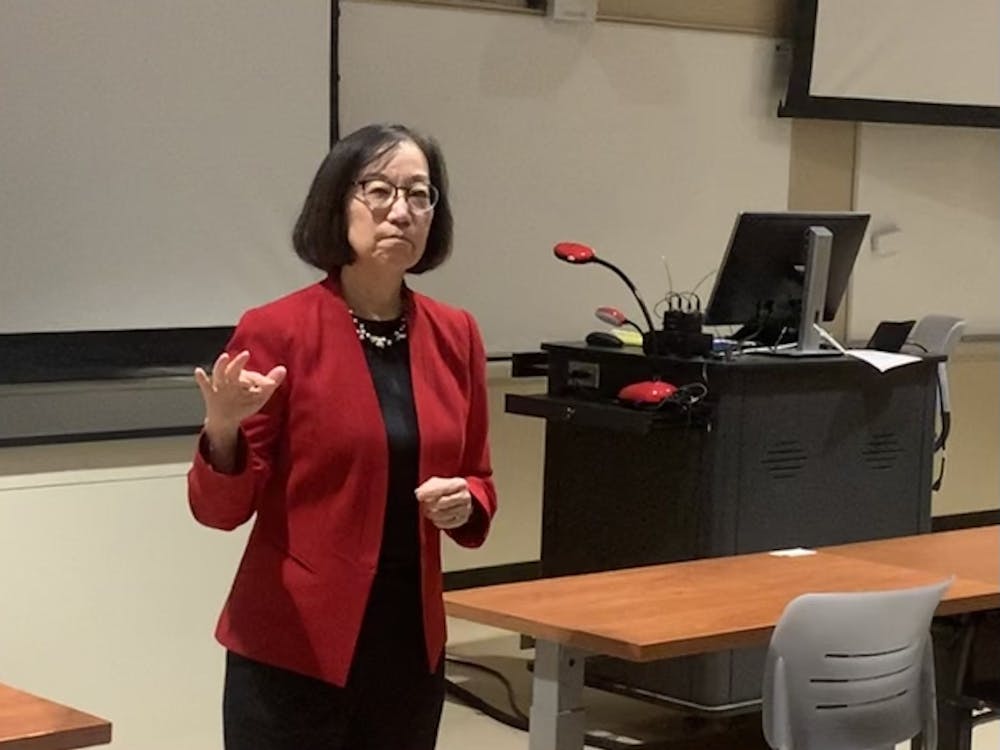Lynn Okagaki, a finalist in the search for Miami University’s new provost, met with members of Miami’s Oxford campus in an open forum to answer questions on Friday, Nov. 18.
Since 2016, Okagaki has worked in the role of deputy provost of academic affairs at the University of Delaware. Before that, she was the dean of the College of Education and Human Development for five years.
Okagaki also served as the commissioner for education research in the Institute of Education Sciences in the U.S. Department of Education. She has also held roles at Yale University, Cornell University and the University of Houston.
Okagaki started the forum by sharing her interest in working for Miami.
“You have such a long and strong position in being student-centered and caring about your students,” Okagaki said. “You have a great reputation for enacting a teacher-scholar model that actually works.”
Audience members then asked Okagaki specific questions, which have been paraphrased below with her responses. Miami asks for people to provide feedback on Okagaki for the provost search using this form. The form is open until Dec. 5.
Q: What are the biggest challenges you see people facing at Miami?
Okagaki: “You have to figure out … who's the person that when they say this is an issue, this is a problem you have to attend to. When they bring it up, it really is a privilege … I would use my direct reports. I would go to their offices as often as they would come to mine, or we would go for a walk and walk campus and talk.”
Q: What are your thoughts on liberal education?
Okagaki: “Liberal education is getting a bad rap right now. It has been for the last several years as people become so ‘you need a job’ focused. I think in the liberal arts, education is the foundation for a lifetime of learning. It’s the foundation for somebody to have an entire career.”
Q: How do you see the arts and humanities fitting in with universities today?
Okagaki: “I'm a dancer, and in fact, the only class that I've been teaching the last couple of years is a ballet class. I believe that the arts, whether it's music, it's visual arts, it’s dance, the arts translate the meaning of our culture, the meaning of our lives … It’s part of the reason for living.”
Enjoy what you're reading?
Signup for our newsletter
Q: Should part of a liberal education include a technology component?
Okagaki: “Technology is what made us still able to connect with people [during the pandemic]. Technology is what made us able to continue relationships, continue to work, continue to educate, continue our lives. So I think it's part of our culture. Not that we need to know how it works, necessarily, but certainly it ought to be something that we're exposed to.”
Q: What’s an example of a goal you achieved?
Okagaki: “[We had a] task force, comprised of faculty, staff, some administrators, and we looked at advising, who came up with recommendations … And one of the outcomes for us was to improve the four year graduation rate … We want students to take on average 15 credits a semester … [Prior to the task force] 15% of first-time students completed 15 credits, and that jumped to 67% of students completing 15 credits.”
Q: What are your thoughts on recruiting and retaining faculty with marginalized identities?
Okagaki: “We have to be intentional. We have to start building relationships with potential faculty before they’re on the job market. That means at conferences, going to their talks. That means talking to colleagues and other institutions who might have students who are in the pipeline, and creating, for example, a summer symposium, where you invite … students to come and present their research and hopefully have a good experience here … Retaining faculty is harder, because often you'll get the bright star and then especially before they're tenured or right after they're tenured, a more prestigious institution will come along and pick them up.”




